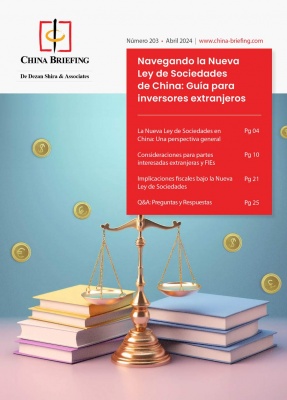China Outbound: Low Operational Costs Turn ASEAN into Preferred Destination for Businesses Relocating From China
Our Latest Round-Up of Business News Affecting China-Based Businesses Investing in Asia
In this edition of China Outbound, we compare the operational costs in Vietnam and China’s Pearl River Delta, one of China’s key engines of growth and a magnet for foreign direct investment (FDI). Vietnam’s lower operational costs and abundant supply of labor make it a top location for manufacturers shifting production capacity. We discuss Thailand and ASEAN countries’ new investment promotion policies and how these will impact foreign businesses looking to relocate from China. Lastly, we take a look at China’s growing ties with ASEAN and Vietnam’s Free Trade Agreement, as well as the the potential benefits of these trade deals for foreign businesses.
Report: Vietnam Primary Alternative to China’s Pearl River Delta
A report from Standard Chartered Bank has identified Vietnam as a primary destination for businesses relocating from China’s Pearl River Delta (PRD) region. The report estimates that relocating to Vietnam from the PRD can reduce operating costs by at least 19 percent. According to the report, labor shortages and stricter social insurance requirements for workers have driven wages higher and put additional pressure on manufacturers located in this export powerhouse.
Thailand’s New Investment Promotion Policies Open a New Door to Foreign Investors
After 15 years of sticking to the same regulations, Thailand has finally declared that it will update its investment policy. The Thai Board of Investment (“BOI”) has announced a new seven-year investment promotion strategy, making significant changes to a number of BOI investment promotion policies. The new policies, which came into effect this year and will last until the end of 2021, aim to restructure the Thai economy to a more focused form of investment promotion.
No New Tax Measures from the Philippines for President Aquino’s Final Year
According to recent statements from the Philippine government, the country will not be introducing any major new tax measures during President Benigno Aquino’s final year in office. However, the government will continue to search for efficiencies in the areas of tax administration and collection in order to boost tax receipts. In particular, the government is focusing on widening the tax base and reducing tax avoidance and evasion.
China’s Growing Ties with ASEAN Opens up New Opportunities for Foreign Investment
In recent years, closer economic links between China and the Association of Southeast Asian Nations (ASEAN) has opened up new opportunities for trade and investment between the two. China has been ASEAN’s largest trading partner since 2009, while ASEAN has been the third-largest trading partner of China since 2011, largely thanks to the Free Trade Agreement between the two.
Establishing a Liaison Office in India
Liaison offices (LOs) are a popular option for foreign investors exploring the Indian market for the first time. In contrast to other business structures, LOs allow foreign companies to establish a light footprint in India while keeping their financial, legal and administrative commitments low.
Like representative offices (ROs) in China, foreign companies that establish LOs in India can build business-to-business relationships, work with local providers and assess the consumer market. LOs can also facilitate trade with India without incurring tax penalties: products sold to Indian consumers are invoiced to the foreign parent company.
Investors Missing Out on Benefits of Vietnam’s Free Trade Agreements
Vietnam has a range of free trade agreements (FTA) in place, and even more currently in the negotiation phase. However, many investors are still unaware of the potential benefits of these trade deals for their businesses. In fact, many investors are unaware that Vietnam even has an applicable FTA that could be of use to them.
|
Asia Briefing Ltd. is a subsidiary of Dezan Shira & Associates. Dezan Shira is a specialist foreign direct investment practice, providing corporate establishment, business advisory, tax advisory and compliance, accounting, payroll, due diligence and financial review services to multinationals investing in China, Hong Kong, India, Vietnam, Singapore and the rest of ASEAN. For further information, please email china@dezshira.com or visit www.dezshira.com. Stay up to date with the latest business and investment trends in Asia by subscribing to our complimentary update service featuring news, commentary and regulatory insight. |
![]()
 Doing Business in ASEAN
Doing Business in ASEAN
Doing Business in ASEAN introduces the fundamentals of investing in the 10-nation ASEAN bloc, concentrating on economics, trade, corporate establishment and taxation. We also include the latest development news in our “Important Updates” section for each country, with the intent to provide an executive assessment of the varying component parts of ASEAN, assessing each member state and providing the most up-to-date economic and demographic data on each. Additional research and commentary on ASEAN’s relationships with China, India and Australia is also provided.
An Introduction to Doing Business in India 2015 (Second  Edition)
Edition)
Doing Business in India 2015 introduces the fundamentals of investing in India. This comprehensive guide is ideal for businesses looking to enter the Indian market, and companies who already have a presence and want to keep up-to-date with the most recent and relevant policy changes. We discuss a range of pertinent issues for foreign businesses, including India’s most recent FDI caps and restrictions, the key taxes applicable to foreign companies, how to conduct a successful audit, and the procedures for obtaining an employment visa.
 Tax, Accounting, and Audit in Vietnam 2014-2015
Tax, Accounting, and Audit in Vietnam 2014-2015
The first edition of Tax, Accounting, and Audit in Vietnam, published in 2014, offers a comprehensive overview of the major taxes foreign investors are likely to encounter when establishing or operating a business in Vietnam, as well as other tax-relevant obligations. This concise, detailed, yet pragmatic guide is ideal for CFOs, compliance officers and heads of accounting who need to be able to navigate the complex tax and accounting landscape in Vietnam.
- Previous Article Convertire un ufficio di rappresentanza in una WFOE: il trasferimento dei dipendenti
- Next Article A Closer Look at China’s Free Trade Zones – Part I




























